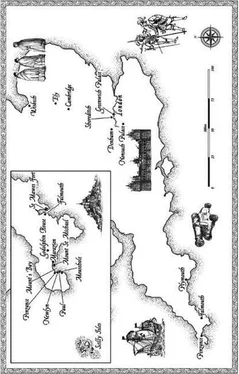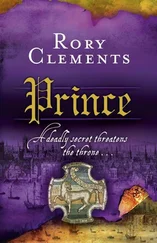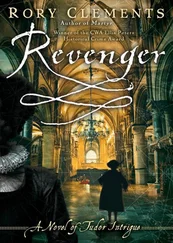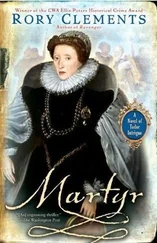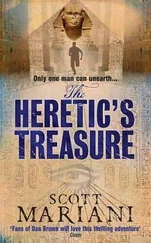Rory Clements - The Heretics
Здесь есть возможность читать онлайн «Rory Clements - The Heretics» весь текст электронной книги совершенно бесплатно (целиком полную версию без сокращений). В некоторых случаях можно слушать аудио, скачать через торрент в формате fb2 и присутствует краткое содержание. Год выпуска: 2013, Издательство: John Murray, Жанр: Исторический детектив, на английском языке. Описание произведения, (предисловие) а так же отзывы посетителей доступны на портале библиотеки ЛибКат.
- Название:The Heretics
- Автор:
- Издательство:John Murray
- Жанр:
- Год:2013
- ISBN:нет данных
- Рейтинг книги:3 / 5. Голосов: 1
-
Избранное:Добавить в избранное
- Отзывы:
-
Ваша оценка:
- 60
- 1
- 2
- 3
- 4
- 5
The Heretics: краткое содержание, описание и аннотация
Предлагаем к чтению аннотацию, описание, краткое содержание или предисловие (зависит от того, что написал сам автор книги «The Heretics»). Если вы не нашли необходимую информацию о книге — напишите в комментариях, мы постараемся отыскать её.
The Heretics — читать онлайн бесплатно полную книгу (весь текст) целиком
Ниже представлен текст книги, разбитый по страницам. Система сохранения места последней прочитанной страницы, позволяет с удобством читать онлайн бесплатно книгу «The Heretics», без необходимости каждый раз заново искать на чём Вы остановились. Поставьте закладку, и сможете в любой момент перейти на страницу, на которой закончили чтение.
Интервал:
Закладка:
How had Topcliffe heard of Shakespeare’s plan to go to Wisbech? It must, surely, have been someone from his own office: Mills, perhaps? Or even Cecil himself? It didn’t matter now.
‘And what did you plan to do with her when you found her? What would you have done had she not escaped?’
‘What do you think? I would have taken her to Mr Topcliffe so that he could extract all her diabolical secrets and the names of every last papist traitor infecting this realm. I should have taken her straight to him — and left you to die.’
‘You would have done this to the woman you claim to have loved?’ Shakespeare did not wait for a reply, but strode towards the door, then turned briefly. ‘Good day, Mr Hooft. I will come for you in two days’ time. If you are not here, ready for me, you may consider yourself an outlaw and subject to the law of England.’
Thomasyn Jade stood alone beside the mound of earth in the churchyard of St Mary-at-Lambeth. The grave was beneath an old yew tree at the very edge of the field, well away from the tombs and vaults of the great men and women who were buried there. It was a peaceful, disregarded corner, set apart from the church and the archbishop’s palace.
Dean Blague had secured permission for Sister Michael to be buried in this ground. He had not told the incumbent nor the archbishop the truth about her faith, merely saying she was a Christian friend who needed a final place of rest.
Thomasyn, too, had compromised on Sister Michael’s behalf. She was well aware that, as a Catholic nun, she might not have liked the Protestant prayers that were said over her, but this was a holy place, whatever sect you belonged to. The church was named after the mother of Christ and it would have to do. Perhaps it might have amused the ragged old nun to lie so close to the graves of dukes and duchesses — even the grandmother of Queen Elizabeth. For herself, Thomasyn could not take seriously the doctrinal distinctions so beloved of the clergy. Did Protestants and Catholics not worship the same God and read from the same scripture?
The day was warm. In her purse, Thomasyn had a great deal of money, given her by John Shakespeare. He would say no more about it, other than that it had belonged to Sister Michael and had been impounded. Thomasyn could do with it what she wished, for he was certain the old nun would want her to have it. She had spent some of it on this funeral, and she had plans for the remainder. And should she need it, there was a promise of more to come, from the family of Father Southwell in Norfolk.
Bending down, she placed a posy of wildflowers at the head of the grave beside the little stone she had bought. She knelt awhile and said a prayer, knowing that Sister Michael would have liked that. It had been many years since Thomasyn had prayed. Back then, the ritual had been meaningless; her words and thoughts had merely wafted away into empty air, never to be heard. Now she expected no more, but she said the paternoster all the same.
The way from Waterbeach to Wisbech was a great deal easier than on Shakespeare’s last visit. Now the floods had gone and the sky was clear. Gangs of parishioners were hard at work repairing the causeways and paths. It was a simple, gentle ride through a flat landscape. So this, he thought, is how it will look all year round if engineers such as Paul Hooft ever have their way and dig drainage channels to run off the floodwaters.
When he arrived at Wisbech Castle a little before dusk, he knew immediately that little had changed. From deep within the prison walls he heard shouting and banging: the seminary priests and the Jesuit faction were still at each other’s throats.
‘Mr Shakespeare,’ keeper William Medley said, the surprise in his eyes evident. ‘I had not expected the pleasure.’
‘Is all in order?’
‘Indeed, it is. The castle is now run with severe discipline and rigour, as befitting a prison for traitors. And it is a great deal more secure with the guards sent by Sir Robert.’
‘What are those shouts I hear?’
‘A minor disturbance, I am sure.’
‘Well, we will talk of that in due course. For the moment, you will find me food and lodging, then bring Gavin Caldor to me in your rooms in an hour’s time. Let him know he is to appear before me. I would like him to sweat awhile.’
Before this journey, Shakespeare had conversed again with Will about Caldor: Jesuit lay brother, builder of hiding holes and servant to Father Weston. His brother recalled him as an intense young man who spent more time trying to convert the players than he did on building sets.
It was clear that Caldor was the man with the connections at the Theatre. He was cousin to Garrick Loake and must have encountered both Lucia Trevail and Regis Roag. It was young Caldor who had given Beatrice papers of introduction to their furtive world of papist intrigue. But was the plan his? Was he the one with the simple idea of how to get a band of armed men into the presence of the Queen and her senior government officers by staging a play?
While Weston would never talk — and while Cecil insisted he be denied his martyrdom — Caldor most assuredly would. Fear would loosen his tongue.
Medley’s face creased into a grimace. ‘He is dead, Mr Shakespeare.’
‘Dead? How?’
‘Hanged himself a week ago.’
Shakespeare saw again the young man drenched in sweat, pissing himself with fear. He remembered how he had used that fear against Caldor — fear of the Tower, of the rack, of Topcliffe and his devilish irons, of the scaffold — and imagined how terrified he would have been when the news of the failure of the plot at Nonsuch reached him.
Shakespeare felt sick to his stomach. He very much wished to see Father Weston once more to tell him what he thought of him, but he was not certain he could stand to be in his presence again.
It was time to go home, to his family.
Chapter 47
Back in London, with Hooft duly sent on his way aboard a Dutch trading vessel, Shakespeare had a meeting with Sir Robert Cecil.
‘Still no news of her, John?’
‘Nothing. Not a single word.’
‘Where do you think she is?’
Shakespeare gazed out of the window. The sun was full in the south. He supposed that she must be somewhere in that vague direction, certainly across the narrow sea. ‘Spain, perhaps, or some nunnery.’
Cecil recoiled in disbelief. ‘Lucia in a nunnery?’
Shakespeare laughed. ‘Perhaps not.’
‘Well, if she turns up at the Spanish court, we shall hear soon enough.’
‘With every despatch that arrives, from Madrid, Seville, Valladolid, Paris, Rome, even Prague and the Germanies, I expect to hear of a sighting. Surely, she will grace some royal court with elegant tales of her clever plan to bring a band of assassins into the very presence of the Queen.’
‘ Her plan?’
Shakespeare had thought this over, time and again.
‘I no longer believe this conspiracy was devised at Wisbech, Sir Robert. It began in the heart and mind of Lady Lucia Trevail. As a lady of the Privy Chamber, she had intimate access to the body of Her Majesty. The power of life and death. But she had no desire to sacrifice her own life, so she devised a plan by which she would use her influence to allow half a dozen armed assassins to gain access to the Queen. I believe she took the idea to Wisbech, perhaps to Father Weston or others there. .’
He thought again of the young man Gavin Caldor, hanging dead in his cell, and sensed a bitter taste in his mouth.
‘I doubt she could have made that journey in secret, even under cover, John.’
‘If not herself, then she sent a trusted minion. She knew she needed help and she knew of no better place to go than the Catholic seminary of Wisbech Castle. Maybe it was that other Jesuit in our midst, Henry Garnett, who went for her. And whom did they send back to assist Lucia, but Weston’s own prize convert, his acolyte Sorrow Gray. You may think this is mere conjecture, but I believe it was all Lucia’s doing. She played the part of the Protestant as well as any player at the Theatre.’
Читать дальшеИнтервал:
Закладка:
Похожие книги на «The Heretics»
Представляем Вашему вниманию похожие книги на «The Heretics» списком для выбора. Мы отобрали схожую по названию и смыслу литературу в надежде предоставить читателям больше вариантов отыскать новые, интересные, ещё непрочитанные произведения.
Обсуждение, отзывы о книге «The Heretics» и просто собственные мнения читателей. Оставьте ваши комментарии, напишите, что Вы думаете о произведении, его смысле или главных героях. Укажите что конкретно понравилось, а что нет, и почему Вы так считаете.
